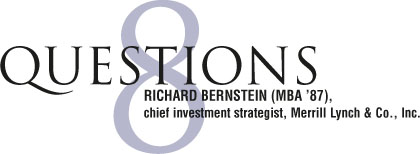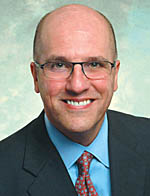|
 
Merrill Lynch is one of the world's leading wealth management, capital markets, and advisory companies, with offices in 40 countries and territories and total client assets of approximately $1.6 trillion. Merrill's star investment strategist (and multiyear member of Institutional Investor's All-America research team), Richard Bernstein has a carefully considered opinion that's heard and respected around the world. This fall he adds a stint as an adjunct professor at NYU Stern, teaching a class on investment strategies.
1. You address many constituencies. To name a few: You are the public voice of the firm on the stock market; you counsel institutional investors; you guide individuals and institutions on what sectors to buy; you call turns in the market. What do you feel is your most important job?
My most important job is stewardship. Merrill is the biggest brokerage firm in the world, so a lot of people follow my advice. Because this position is so visible, people's livelihoods depend on what I say, both within the firm and externally. I take the notion of being a steward of people's futures very seriously — being able to benefit their lives is what is most fulfilling about my job. You can't ask for anything more.
2. You're known for being a contrarian, and an exceptionally accurate one. How did you get that way?
I tend to be a contrarian because that's the way to make money over the long term — as opposed to being a momentum investor. Even prior to going to business school, which I did part-time while working, I believed valuation was very important. People think you just want to buy cheap stocks, but that's not the reason. There's an economic reason why that works, and this is one of the things I took away from NYU Stern — that the links between the economic world and the financial world are tighter and more numerous than people realize. I often preface remarks with "As they taught us in business school...". I don't think people realize how tied in academe is to the real world.
3. You use various quantitative models to guide you. Which ones are most useful?
Funny enough, the model I find most useful is something I learned in my operations research class in business school: control theory. In manufacturing you use control theory for quality control purposes. I was playing around one day with the theory, when I was attending Stern and working at EF Hutton, and it turned out to be a great stock market timing model for the S&P 500, in terms of asset allocation, not for any short-term purposes.
4. We're talking in July, and stocks have been disappointing recently. What's the outlook for the end of this year?
Our big theme for 2008 is that the underlying trend for market volatility won't change. The credit bubble is not just a US event, it has impact globally on growth, and people will see how broad it is into 2009. Over the next 12 months, we believe we'll be looking at mid-single-digit returns.
5. What is a reasonable time frame for an investment to pay off? Does it vary based on the economic cycle?
There are three very easy ways to build wealth: Extend your time horizon; compound dividends; and diversify. Research shows the longer your horizon, the better. Day trading is basically luck. I don't believe this varies based on the economic cycle. You should review your portfolio based on time (quarterly, semi-annually, annually), not on events.
6. You were an early fan of the energy sector when others were captivated by technology. What do you think of energy and oil now? What do you think of technology now?
We're bigger fans at this point of older tech stocks — the large-cap technology companies. They remain undervalued versus the S&P 500. Regarding the energy sector, we're still long-term bullish, but the group has gotten a little ahead of itself, and since it's traditionally a lagging sector, we think oil will probably come down in the next six to 12 months and energy stocks will underperform.
7. How has your job evolved over the years?
In November, I'll have been at Merrill 20 years. I started as a senior quantitative analyst in the equity strategy group. There were three of us at the time. Roughly three years ago, I was appointed chief investment strategist, with about 40 people in my department. As my interests have expanded over the years, the issues I get to deal with are proportionately broader, which is great. In my current position, the number of constituencies has increased. At first, equities accounted for 90 percent of the demands. Now I get demands from fixed income, trading, private client, and investment banking as well, and equities account for maybe 50 percent.
8. How has your education at NYU Stern influenced your career?
Attending business school part-time while working was difficult, but I found what I was learning could be completely integrated into my job. In fact, I wrote a journal article that incorporated what I was learning in my bond math class into a way of valuing equities.
|


![]()